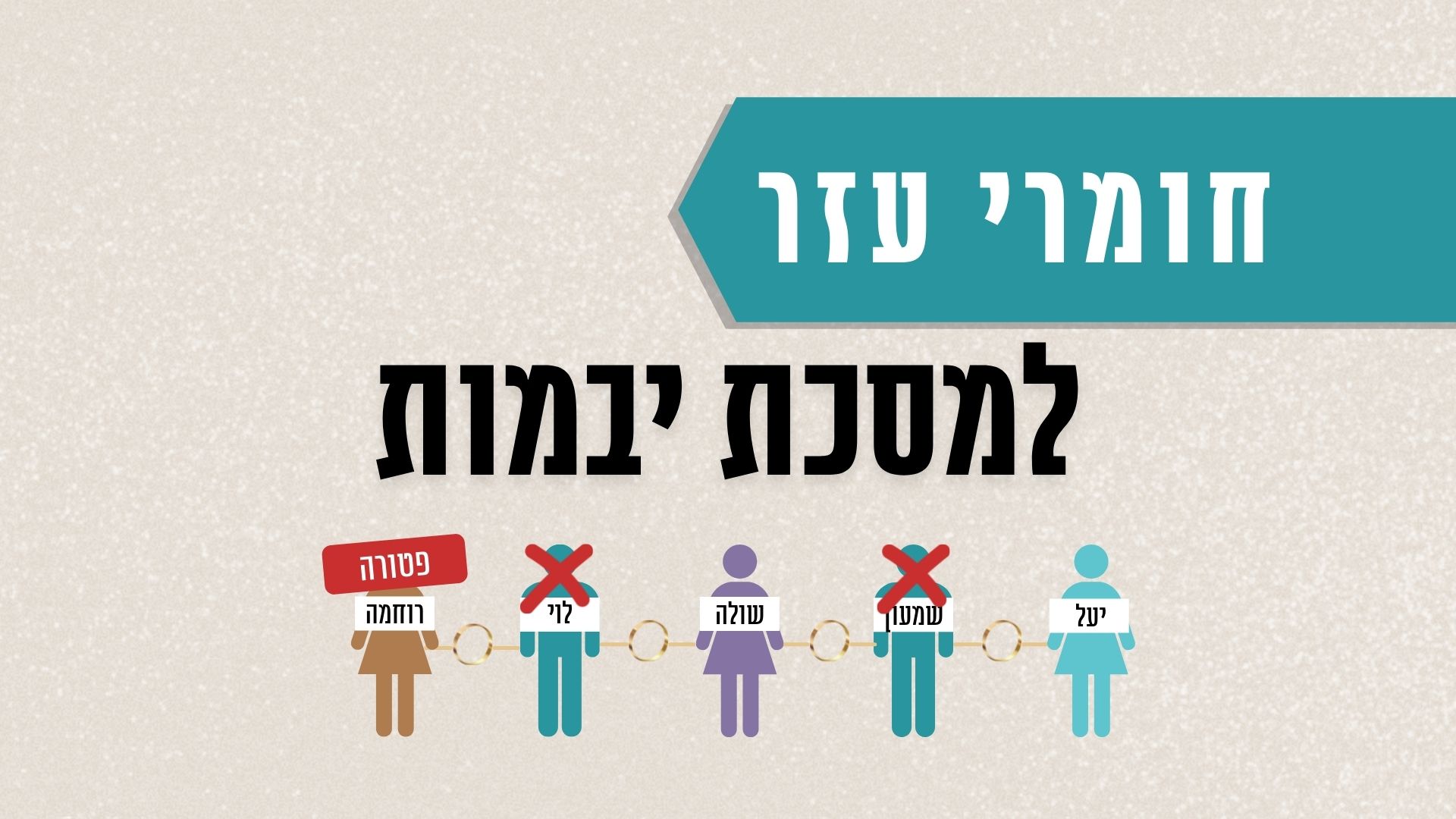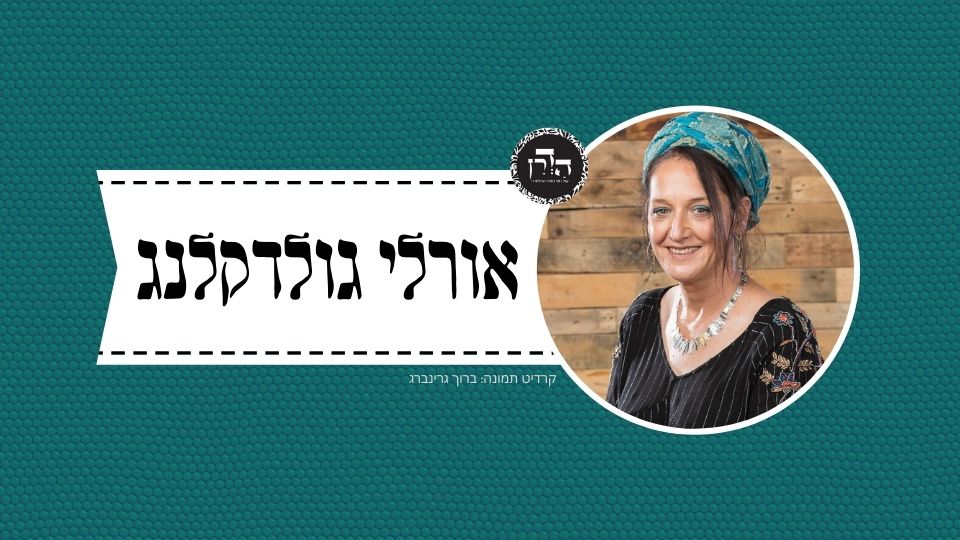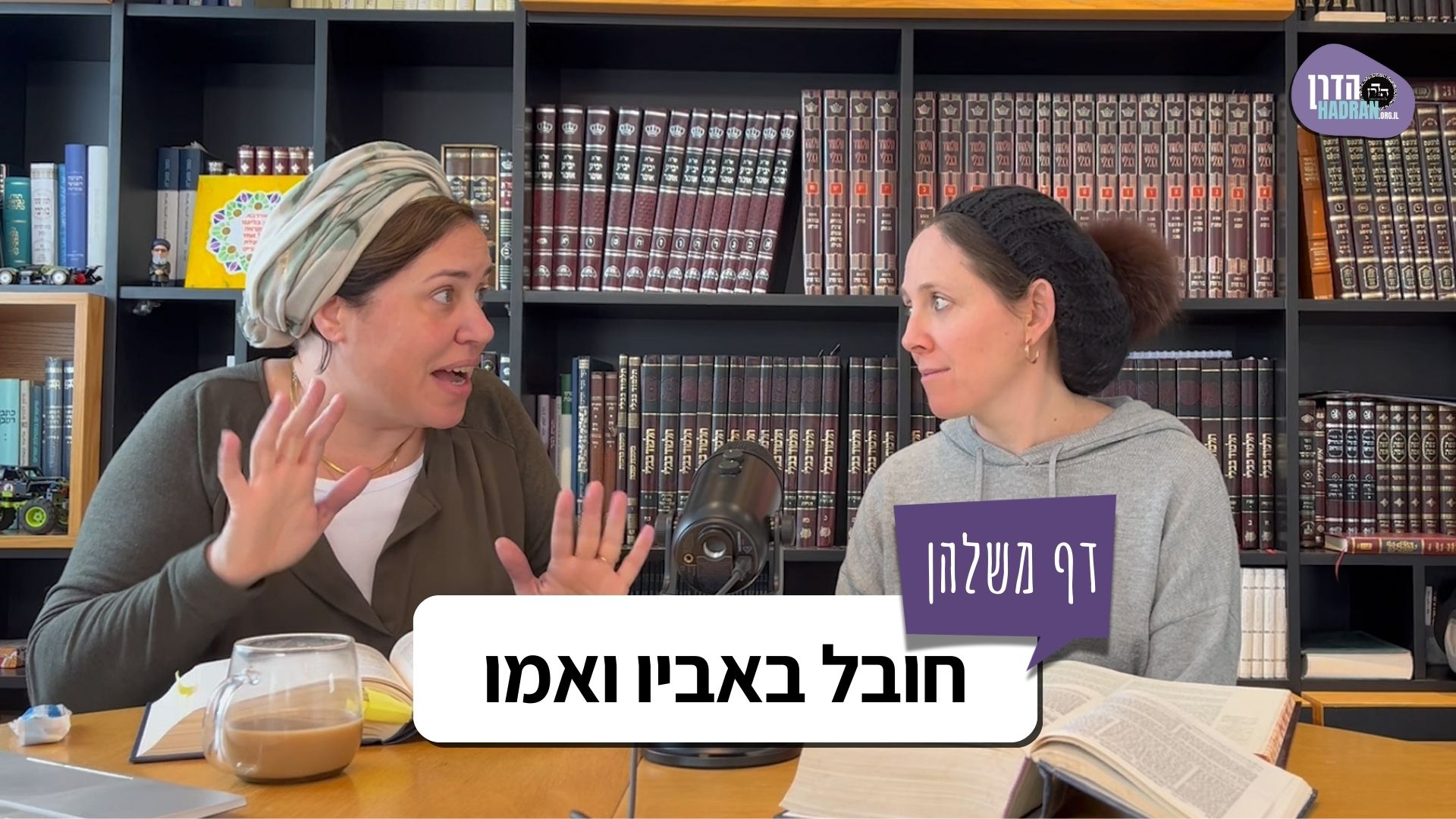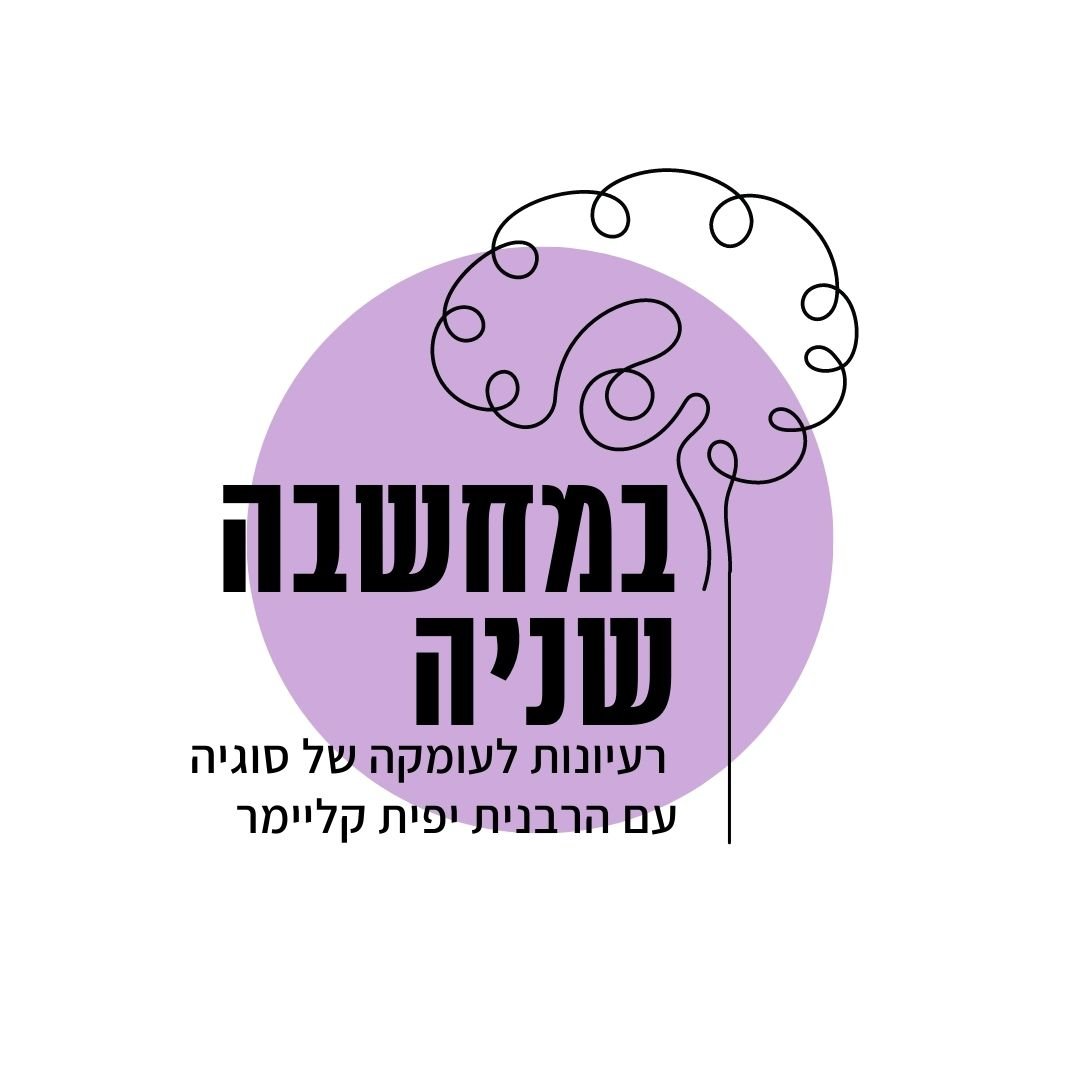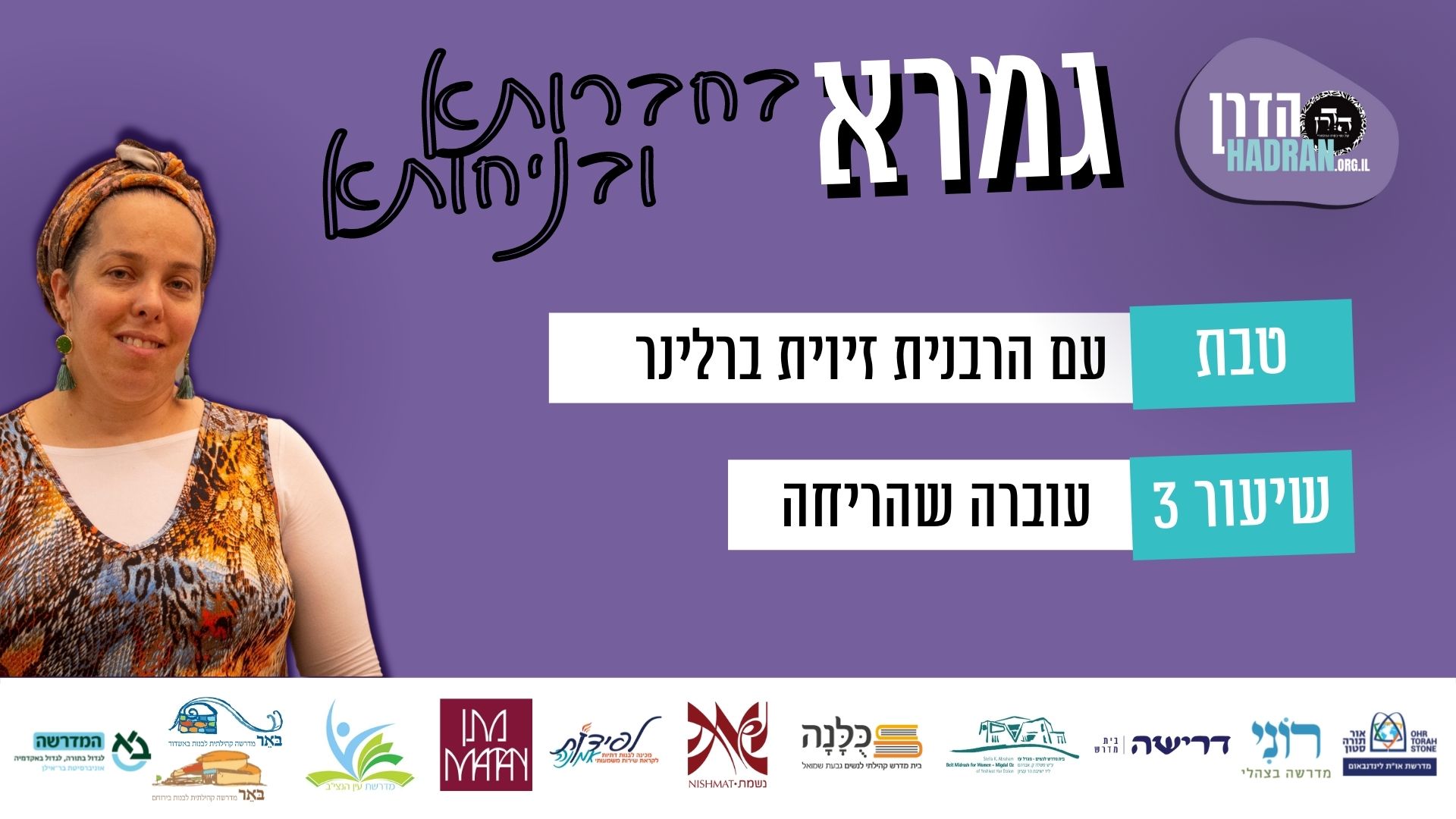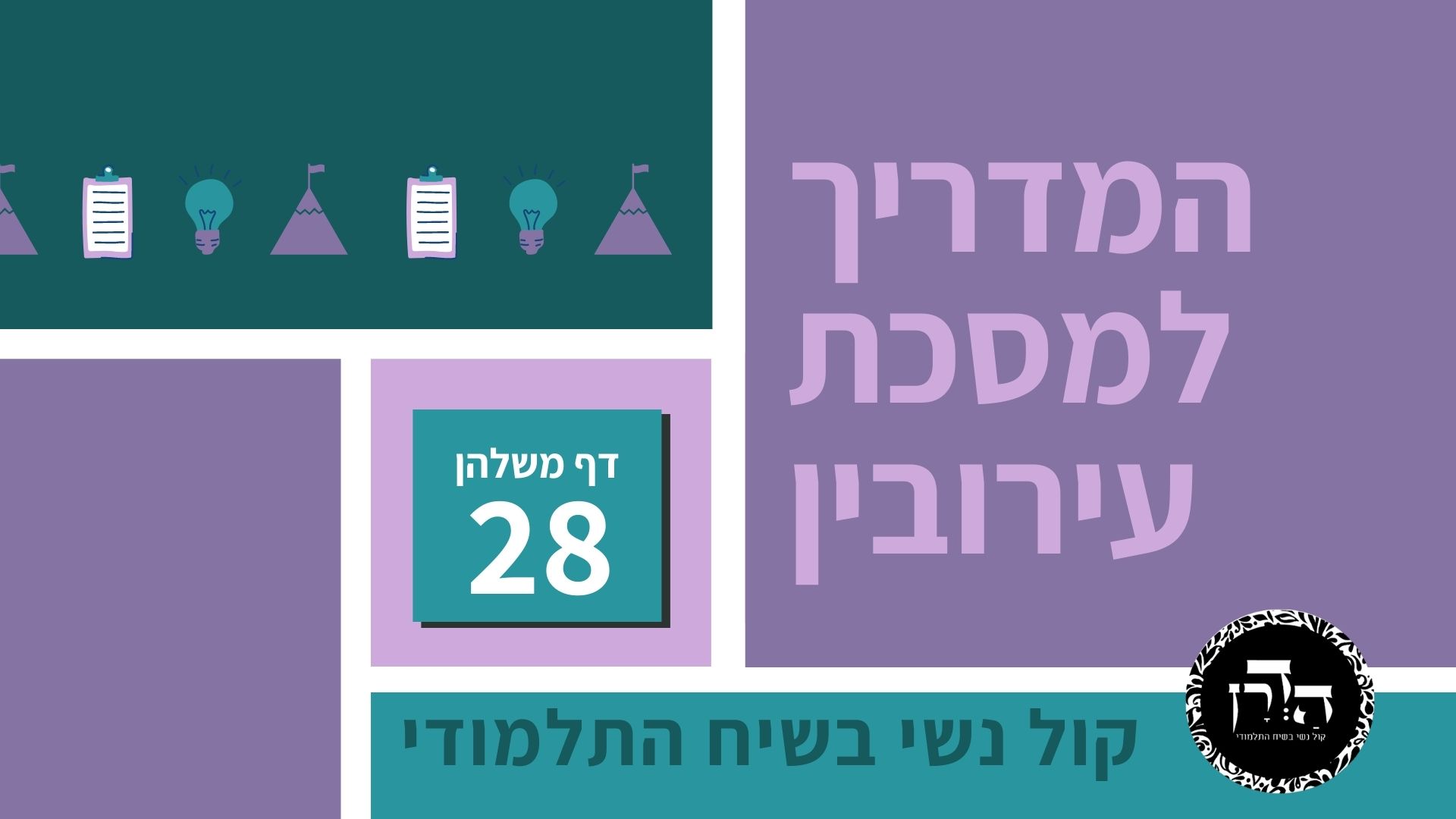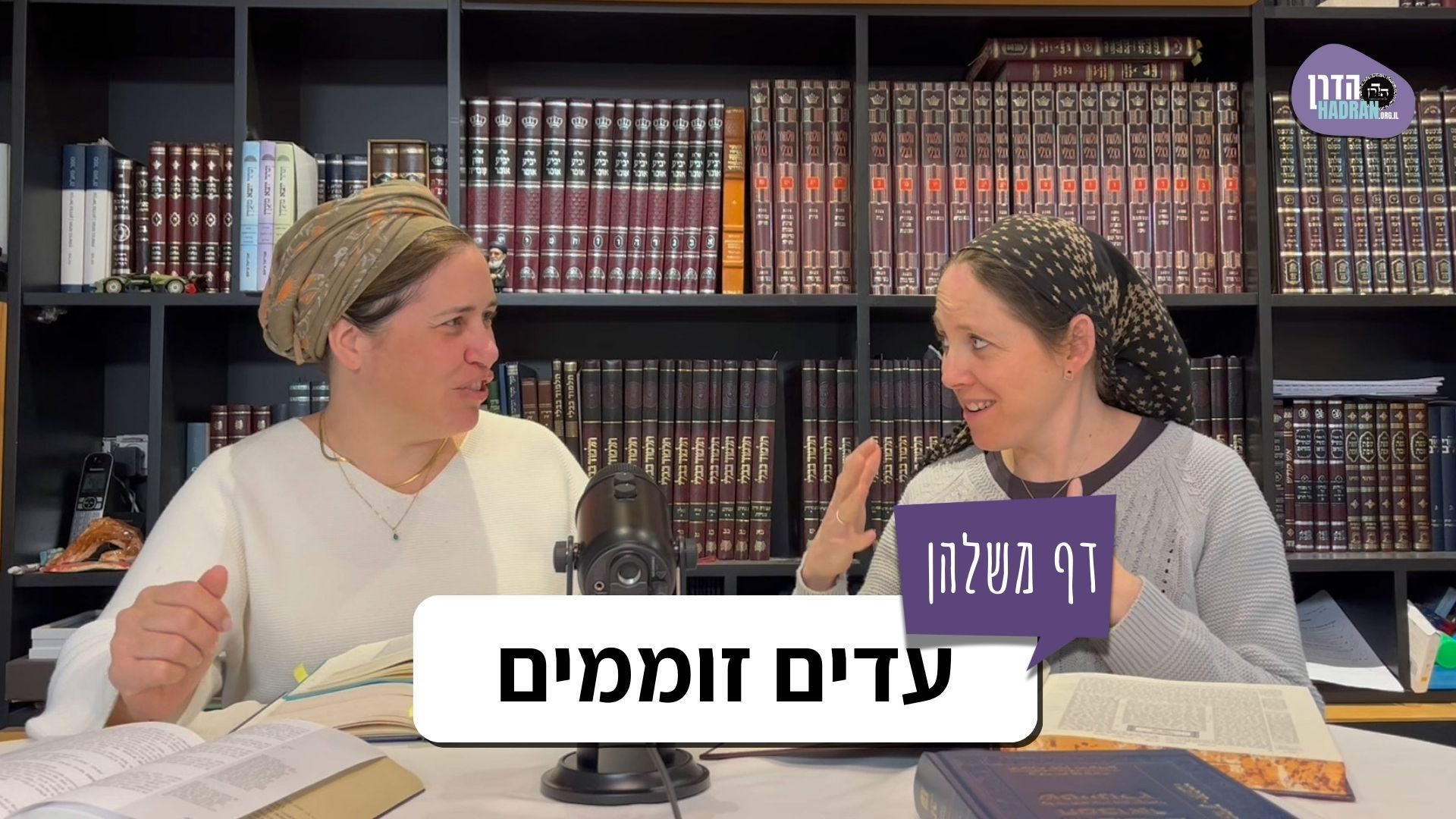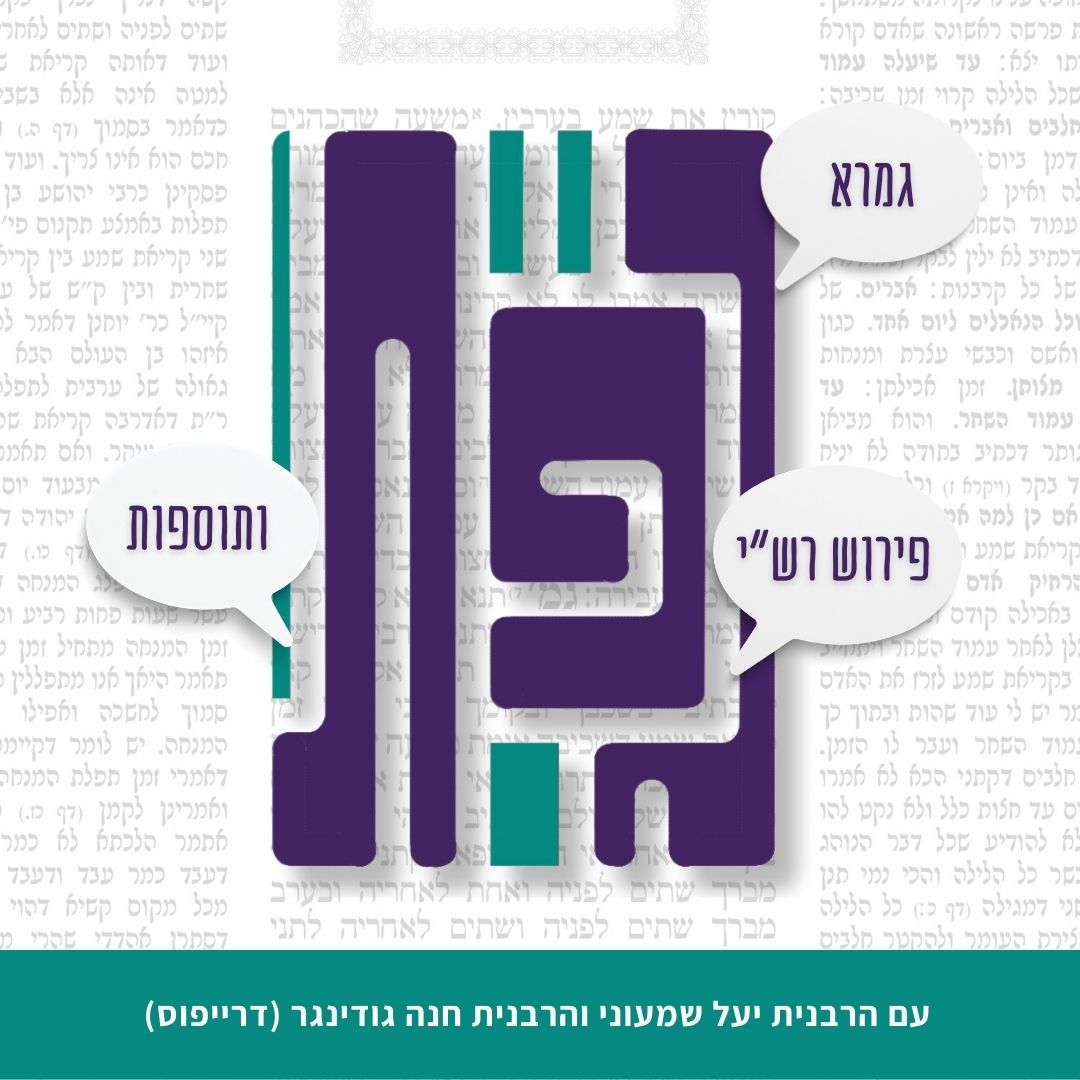הגמרא מביאה עוד מקרים שיש איסורים שונים ויש מחלוקת האם חייבים על יותר מאיסור אחד. הבנות שונות למחלוקות מובאות. האם לאיסור אבר מן החי, צריך לאכול את כל הכזית בבת אחת? אם כן, האם גם צריך לבלוע הכל בבת אחת? האם מי שאכל חצי זית והקיא ואכל חצי זית אחר או אפילו אותו חצי זית לאחר שהקיאו, יהיה חייב?
הלימוד השבוע מוקדש לזכות ולשלום הַיְימׇנוֹט אֱמוּנָה בַּת באנצ’י (קָסָאוּ) בת 11 שנעלמה במקום מגוריה בצפת, לפני שנתיים, ביום ט”ז אדר תשפ”ד (25.2.24), ולא נודעו עקבותיה.
הלימוד השבוע מוקדש למען ביטחון המדינה, החיילים והאזרחים, ולמען חירותו של העם האיראני. שנזכה בקרוב שיתקיים בנו הפסוק: "לַיְּהוּדִים הָיְתָה אוֹרָה וְשִׂמְחָה וְשָׂשֹׂן וִיקָר”.
הלימוד השבוע מוקדש לזכות וְלִשְׁלוֹם הָיימָנוֹט אֱמוּנָה בַּת באנצ’י (קָסָאוּ), בת 11 שנעלמה במקום מגוריה בצפת, לפני שנתיים, ביום ט”ז אדר תשפ״ד (25.2.24), ולא נודעו עקבותיה. אנו מתפללים שֶׁתִּמָּצֵא וְתוּשַׁב לביתה במהרה!
רוצה להקדיש שיעור?

כלים
הלימוד השבוע מוקדש לזכות ולשלום הַיְימׇנוֹט אֱמוּנָה בַּת באנצ’י (קָסָאוּ) בת 11 שנעלמה במקום מגוריה בצפת, לפני שנתיים, ביום ט”ז אדר תשפ”ד (25.2.24), ולא נודעו עקבותיה.
הלימוד השבוע מוקדש למען ביטחון המדינה, החיילים והאזרחים, ולמען חירותו של העם האיראני. שנזכה בקרוב שיתקיים בנו הפסוק: "לַיְּהוּדִים הָיְתָה אוֹרָה וְשִׂמְחָה וְשָׂשֹׂן וִיקָר”.
הלימוד השבוע מוקדש לזכות וְלִשְׁלוֹם הָיימָנוֹט אֱמוּנָה בַּת באנצ’י (קָסָאוּ), בת 11 שנעלמה במקום מגוריה בצפת, לפני שנתיים, ביום ט”ז אדר תשפ״ד (25.2.24), ולא נודעו עקבותיה. אנו מתפללים שֶׁתִּמָּצֵא וְתוּשַׁב לביתה במהרה!
כלים
העמקה
רוצה להבין מה באמת קורה מתחת לפני השטח של הסוגיה?
שיעורים, פודקאסטים והרחבות של מיטב המורות שלנו יפתחו לך עוד זוויות וכיווני חשיבה.
חדשה בלימוד הגמרא?
זה הדף הראשון שלך? איזו התרגשות עצומה! יש לנו בדיוק את התכנים והכלים שיעזרו לך לעשות את הצעדים הראשונים ללמידה בקצב וברמה שלך, כך תוכלי להרגיש בנוח גם בתוך הסוגיות המורכבות ומאתגרות.
פסיפס הלומדות שלנו
גלי את קהילת הלומדות שלנו, מגוון נשים, רקעים וסיפורים. כולן חלק מתנועה ומסע מרגש ועוצמתי.
חולין קג
אכל אבר מן החי מן הטרפה ר’ יוחנן אמר חייב שתים ור’ שמעון בן לקיש אמר אינו חייב אלא אחת
With regard to one who ate a limb from a living animal that is a tereifa, Rabbi Yoḥanan says: He is liable to receive two sets of lashes, and Rabbi Shimon ben Lakish says: He is liable to receive only one set of lashes.
בשלמא לר’ יוחנן ניחא אלא לר’ שמעון בן לקיש קשיא
The Gemara comments: Granted, according to the opinion of Rabbi Yoḥanan, this works out well because the prohibitions of eating a limb from a living animal and of eating flesh severed from a tereifa are derived from two different verses. But according to the opinion of Rabbi Shimon ben Lakish, it is difficult; why does he hold that the individual receives only one set of lashes?
אמר רב יוסף לא קשיא כאן בבהמה אחת כאן בשתי בהמות בשתי בהמות מיחייב שתים בבהמה אחת פליגי
Rav Yosef said: This is not difficult. Here it is referring to one animal, but there it is referring to two animals. Rav Yosef clarifies: In a case of two animals, e.g., where one ate a limb from a living animal and flesh severed from a different animal that was a tereifa, everyone agrees that he is liable to receive two sets of lashes. But in a case where he ate from one animal, e.g., he ate a limb severed from a live tereifa animal, Rabbi Yoḥanan and Rabbi Shimon ben Lakish disagree.
בבהמה אחת במאי פליגי אמר אביי כגון שנטרפה עם יציאת רובה מ”ס בהמה בחייה לאברים עומדת ואיסור טרפה ואיסור אבר בהדי הדדי קאתו
The Gemara asks: With regard to the case of one animal, in what case do they disagree? Abaye said: They disagree, for example, in a case where the animal became a tereifa as the majority of it emerged from its mother’s womb. One Sage, Rabbi Yoḥanan, holds that an animal, even during its life, stands to be divided into limbs, and therefore each of its limbs is considered a separate entity; and here the prohibition of eating a tereifa and the prohibition of eating a limb from a living animal come into effect at the same time. Consequently, both prohibitions apply.
ומ”ס בהמה בחייה לאו לאברים עומדת ולא אתי איסור אבר חייל אאיסור טרפה
And one Sage, Rabbi Shimon ben Lakish, holds that during its life an animal does not stand to be divided into limbs. Consequently, although the prohibition of eating a tereifa comes into effect when it is born, the prohibition of eating a limb from a living animal does not take effect until the limb is actually severed from the animal, and at that point the prohibition of a limb from a living animal does not come and take effect upon the already existing prohibition of a tereifa.
ואיבעית אימא דכ”ע בהמה בחייה לאו לאברים עומדת ובמיתי איסור אבר מיחל אאיסור טרפה קא מיפלגי מר סבר אתי איסור אבר חייל אאיסור טרפה ומר סבר לא אתי איסור אבר חייל אאיסור טרפה
And if you wish, say instead that everyone agrees that during its life an animal does not stand to be divided into limbs, and they disagree with regard to whether the prohibition of a limb from a living animal comes and takes effect upon the already existing prohibition of a tereifa. One Sage, Rabbi Yoḥanan, holds that the prohibition of eating a limb from a living animal, which applies to gentiles as well as to Jews, comes and takes effect upon the already existing prohibition of eating a tereifa. And one Sage, Rabbi Shimon ben Lakish, holds that the prohibition of eating a limb from a living animal does not come and take effect upon the already existing prohibition of eating a tereifa.
איבעית אימא דכ”ע בהמה בחייה לאברים עומדת וכגון שנטרפה לאחר מכאן ובמיתי איסור טרפה חייל אאיסור אבר קא מיפלגי
And if you wish, say instead that everyone agrees that an animal, even during its life, stands to be divided into limbs, and the dispute is about a case where the animal became a tereifa afterward, i.e., after it was born, and they disagree with regard to whether the prohibition of a tereifa comes and takes effect upon the already existing prohibition of a limb from a living animal.
מר סבר אתי וחייל ומר סבר לא אתי וחייל
One Sage, Rabbi Yoḥanan, holds that the prohibition of eating a tereifa comes and takes effect in addition to the already existing prohibition of eating a limb from a living animal. And one Sage, Rabbi Shimon ben Lakish, holds that the prohibition of eating a tereifa does not come and take effect in addition to the already existing prohibition of eating a limb from a living animal.
רבא אמר כגון שתלש ממנה אבר וטרפה בו מר סבר בהמה בחייה לאברים אינה עומדת איסור אבר ואיסור טרפה בהדי הדדי קאתו
Rava says an alternative explanation: This is referring to a case where he severed a limb from the animal and thereby rendered the animal a tereifa. One Sage, Rabbi Yoḥanan, holds that during its life, an animal does not stand to be divided into limbs. Consequently, the prohibition of a limb from a living animal and the prohibition of a tereifa come into effect at the same time.
ומר סבר בהמה בחייה לאברים עומדת ולא אתי איסור טרפה חייל אאיסור אבר
And one Sage, Rabbi Shimon ben Lakish, holds that even during its life, an animal stands to be divided into limbs, and therefore the prohibition of eating a limb from a living animal takes effect when the animal is born. Consequently, the prohibition of a tereifa does not come and take effect upon the already existing prohibition of a limb from a living animal.
אמר ר’ חייא בר אבא אמר ר’ יוחנן אכל חלב מן החי מן הטרפה חייב שתים אמר ליה ר’ אמי ולימא מר שלש שאני אומר שלש איתמר נמי אמר ר’ אבהו א”ר יוחנן אכל חלב מן החי מן הטרפה חייב שלש
§ Rabbi Ḥiyya bar Abba says that Rabbi Yoḥanan says: If one ate forbidden fat from a living animal that is a tereifa he is liable to receive two sets of lashes. Rabbi Ami said to him: But let the Master say that he is liable to three sets of lashes, because I say that the correct version of Rabbi Yoḥanan’s statement is that he is liable to three sets of lashes. It was also stated: Rabbi Abbahu says that Rabbi Yoḥanan says: If one ate forbidden fat from a living animal that is a tereifa he is liable to three sets of lashes.
במאי קמיפלגי כגון שנטרפה עם יציאת רובה מ”ד שלש קסבר בהמה בחייה לאברים עומדת דאיסור חלב ואיסור אבר ואיסור טרפה בהדי הדדי קאתו
The Gemara asks: With regard to what principle do Rabbi Ḥiyya bar Abba and Rabbi Ami disagree? They disagree in a case where the animal became a tereifa as the majority of it emerged from its mother’s womb; the one who said that he is liable to three sets of lashes holds that even during its life an animal stands to be divided into limbs, and each of its limbs is considered as a separate entity, so that the prohibition of eating forbidden fat, the prohibition of eating a limb from a living animal, and the prohibition of eating a tereifa come into effect at the same time.
ומ”ד שתים קסבר בהמה בחייה לאו לאברים עומדת ואיסור חלב ואיסור טרפה איכא איסור אבר לא אתי חייל
And the one who said that he is liable to two sets of lashes holds that during its life, an animal does not stand to be divided into limbs, i.e., its limbs are not considered separate entities while the animal is alive. Consequently, the prohibition of eating forbidden fat and the prohibition of eating a tereifa animal apply, as they came into effect at the same time, when the animal was born. By contrast, the prohibition of eating a limb from a living animal does not come and take effect, due to the fact that other prohibitions already apply.
ואי בעית אימא דכ”ע בהמה בחייה לאו לאברים עומדת ובמיתי איסור אבר וחייל אאיסור חלב ואאיסור טרפה קא מיפלגי מר סבר אתי חייל ומר סבר לא אתי חייל
And if you wish, say instead that everyone agrees that during its life an animal does not stand to be divided into limbs, and each of its limbs is not considered as a separate entity. But they disagree with regard to whether the prohibition of eating a limb from a living animal comes and takes effect upon the already existing prohibition of eating forbidden fat and the already existing prohibition of eating a tereifa. One Sage, Rabbi Ami, holds that it does come and take effect, and one Sage, Rabbi Ḥiyya bar Abba, holds that it does not come and take effect.
ואי בעית אימא דכולי עלמא בהמה בחייה לאברים עומדת וכגון שנטרפה לאחר מכאן ובמיתי איסור טרפה מיחל אאיסור אבר קא מיפלגי
And if you wish, say instead that everyone agrees that during its life an animal stands to be divided into limbs, and it is a case where the animal became a tereifa afterward, i.e., after it was born; and they disagree with regard to whether the prohibition of eating a tereifa comes and takes effect upon the already existing prohibition of eating a limb from a living animal.
מר סבר אתי חייל מידי דהוה אחלב דאמר מר התורה אמרה יבא איסור נבלה יחול על איסור חלב ויבא איסור טרפה יחול על איסור חלב
One Sage, Rabbi Ami, holds that it does come and take effect, just as is the halakha with forbidden fat. As the Master said that in the verse: “And the fat of a carcass, and the fat of a tereifa may be used for any other service; but you shall in no way eat of it” (Leviticus 7:24), the Torah said: Let the prohibition of eating a carcass come and take effect upon the prohibition of eating forbidden fat, despite the fact that the prohibition of forbidden fat came into effect first. And similarly, the word “tereifa” teaches: Let the prohibition of eating a tereifa come and take effect upon the prohibition of eating forbidden fat. Consequently, one who eats forbidden fat from a tereifa is liable to receive two sets of lashes. Rabbi Ami holds that just as the prohibition of eating a tereifa takes effect in addition to the prohibition of eating forbidden fat, it also takes effect in addition to the prohibition of eating a limb from a living animal.
ואידך אחלב הוא דחייב דהותר
And the other Sage, Rabbi Ḥiyya bar Abba, holds that it is only the prohibition of eating forbidden fat for which he is liable in addition to being liable for the prohibition of eating a tereifa. The prohibition of eating a tereifa takes effect in addition to the prohibition of eating forbidden fat because with regard to the latter, there are permitted circumstances that serve as exceptions
מכללו אבל אבר דלא הותר מכללו לא
to its general prohibition, as the fat of an undomesticated animal is permitted. But with regard to a limb from a living animal, where there are no permitted circumstances to its general prohibition, the prohibition of consuming a tereifa does not take effect.
כי אתא רב דימי אמר בעא מיניה רבי שמעון בן לקיש מרבי יוחנן חלקו מבחוץ מהו אמר ליה פטור
§ The Gemara continues its discussion of the prohibition against eating a limb from a living animal. When Rav Dimi came from Eretz Yisrael to Babylonia, he said: Rabbi Shimon ben Lakish inquired of Rabbi Yoḥanan: If one took from a living animal a limb that was an olive-bulk and divided it into two pieces when it was outside his mouth and ate each piece separately, what is the halakha? Rabbi Yoḥanan said to him: He is exempt.
מבפנים מאי אמר ליה חייב
Reish Lakish then asked Rabbi Yoḥanan: If he placed an olive-bulk of a limb from a living animal inside his mouth and then divided it and swallowed the two parts separately, what is the halakha? Rabbi Yoḥanan said to him: He is liable to receive lashes.
כי אתא רבין אמר חלקו מבחוץ פטור מבפנים רבי יוחנן אמר חייב וריש לקיש אמר פטור
When Ravin came from Eretz Yisrael to Babylonia he said an alternative version of this discussion. If one took from a living animal a limb that was an olive-bulk and divided it into two pieces when it was outside his mouth, and he then ate each piece separately, he is exempt. If he divided the limb into two parts inside his mouth, Rabbi Yoḥanan says that he is liable, and Reish Lakish says that he is exempt.
רבי יוחנן אמר חייב הרי נהנה גרונו בכזית וריש לקיש אמר פטור אכילה במעיו בעינן וליכא
Rabbi Yoḥanan says he is liable because his throat derives pleasure from an olive-bulk of a limb from a living animal. And Reish Lakish says that he is exempt because in order to be liable we require an act of eating that contains the requisite amount, i.e., an olive-bulk, when it enters his stomach, and in this case there is not a full olive-bulk that enters his stomach at one time.
אלא לרבי שמעון בן לקיש היכי משכחת לה דמחייב אמר רב כהנא בגרומיתא זעירתא
The Gemara asks: According to the opinion of Rabbi Yoḥanan it is clear how one can be liable for eating an olive-bulk of a limb from a living animal. But according to Rabbi Shimon ben Lakish, how can you find a case where one will be liable for eating a limb from a living animal, since the food is generally broken up before he swallows it? Rav Kahana said: One would be liable in a case where he eats a small bone that contains an olive-bulk of meat, bone and sinew all together, and that he can swallow whole.
ורבי אלעזר אמר אפילו חלקו מבחוץ נמי חייב מחוסר קריבה לאו כמחוסר מעשה דמי
As quoted above, Rabbi Yoḥanan and Reish Lakish agree that if one divides a limb from a living animal before placing it in his mouth, he is not liable for eating it. The Gemara adds: But Rabbi Elazar says: Even if one divided the limb outside his mouth he is liable. This is because the fact that the two pieces are lacking in proximity to each other as they are placed in one’s mouth is not comparable to lacking an action, i.e., it is not comparable to a case where he ate only half an olive-bulk. Since he ate an entire olive-bulk, he is liable.
אמר ר”ש בן לקיש כזית שאמרו חוץ משל בין השינים ורבי יוחנן אמר אף עם בין השינים
§ The Gemara cites another dispute between Rabbi Yoḥanan and Reish Lakish pertaining to the measure of an olive-bulk with regard to prohibitions involving eating. Rabbi Shimon ben Lakish says: The olive-bulk of which the Sages spoke with regard to prohibitions involving eating is measured by the food one actually swallows, aside from the food that remains stuck between the teeth. And Rabbi Yoḥanan says that it includes even the food that remains stuck between the teeth.
אמר רב פפא בשל בין שינים דכולי עלמא לא פליגי כי פליגי בין החניכיים מר סבר הרי נהנה גרונו בכזית ומר סבר אכילה במעיו בעינן
In explanation of this dispute, Rav Pappa says: With regard to food that remains stuck between the teeth, everyone agrees that it is not included in measuring an olive-bulk that would render one liable to receive lashes. When they disagree it is with regard to food that remains on the palate, which one tastes but does not swallow. One Sage, Rabbi Yoḥanan, holds that since his throat derives pleasure from an olive-bulk, i.e., he tastes the full olive-bulk, he is liable. And one Sage, Reish Lakish, holds that in order to be liable, we require an act of eating that contains the requisite amount, i.e., an olive-bulk, when it enters his stomach.
אמר רבי אסי אמר רבי יוחנן אכל חצי זית והקיאו וחזר ואכל חצי זית אחר חייב מ”ט הרי נהנה גרונו בכזית
§ The Gemara quotes another related ruling of Rabbi Yoḥanan: Rabbi Asi says that Rabbi Yoḥanan says: If one ate half an olive-bulk of a forbidden food and vomited it, and then ate another half an olive-bulk, he is liable. What is the reason? It is because his throat derives pleasure from an olive-bulk of the forbidden food, even though the full olive-bulk did not actually enter his stomach.
בעא רבי אלעזר מר’ אסי אכל חצי זית והקיאו וחזר ואכלו מהו מאי קא מיבעיא ליה אי הוי עיכול אי לא הוי עיכול ותיבעי ליה כזית
Rabbi Elazar raised a dilemma before Rabbi Asi: If one ate half an olive-bulk of forbidden food and vomited it, and then ate it again, what is the halakha? The Gemara clarifies: What is the dilemma he is raising? If it is about whether the half-olive-bulk that he ate and vomited up is considered to have been digested, in which case it is no longer considered food, or whether it is not considered to have been digested, let him raise the dilemma with regard to an entire olive-bulk. If one eats an entire olive-bulk and vomits it and then eats it again, if the food is considered not to have been digested the first time, he is liable to be flogged twice.
אלא אי בתר גרונו אזלינן אי בתר מעיו אזלינן ותפשוט ליה מדרבי אסי
Rather, his dilemma must be about whether we follow the throat or whether we follow the stomach in measuring how much forbidden food one has swallowed. That being the case, let him resolve the dilemma from that which Rabbi Asi said that Rabbi Yoḥanan said, which indicates that we follow the throat.
רבי אסי גמריה איעקר ליה ואתא ר’ אלעזר לאדכוריה והכי קאמר ליה למה לי חצי זית אחר לימא מר בדידיה דאיכא למשמע מינה תרתי שמעינן מינה דלא הוי עיכול ושמעינן מינה דהרי נהנה גרונו בכזית
The Gemara explains that Rabbi Elazar knew the answer to his question, but Rabbi Asi forgot the statement that he had learned from Rabbi Yoḥanan, and Rabbi Elazar came to remind him of what he had known previously. And this is what Rabbi Elazar was saying to him: Why do I need the case where he swallows another half an olive-bulk? Let the Master teach this ruling in a case where he swallows the same half-olive-bulk he had swallowed previously and vomited, as two principles can be derived from the ruling in that case: We can learn from it that the food was not considered to have been digested the first time he swallowed it, and we can learn from it that since his throat derives pleasure from a full olive-bulk, he is liable.
אישתיק ולא א”ל ולא מידי א”ל מופת הדור לא זימנין סגיאין אמרת קמיה דרבי יוחנן ואמר לך הרי נהנה גרונו בכזית:
Rabbi Asi was silent and did not say anything. Rabbi Elazar said to him: Wonder of the generation, did you not say this case many times before Rabbi Yoḥanan, and he said to you: This person is liable because his throat derives pleasure from a full olive-bulk?
הדרן עלך גיד הנשה
מתני׳ כל הבשר אסור לבשל בחלב חוץ מבשר דגים וחגבים ואסור להעלות עם הגבינה על השלחן חוץ מבשר דגים וחגבים
MISHNA: It is prohibited to cook any meat of domesticated and undomesticated animals and birds in milk, except for the meat of fish and grasshoppers, whose halakhic status is not that of meat. And likewise, the Sages issued a decree that it is prohibited to place any meat together with milk products, e.g., cheese, on one table. The reason for this prohibition is that one might come to eat them after they absorb substances from each other. This prohibition applies to all types of meat, except for the meat of fish and grasshoppers.

